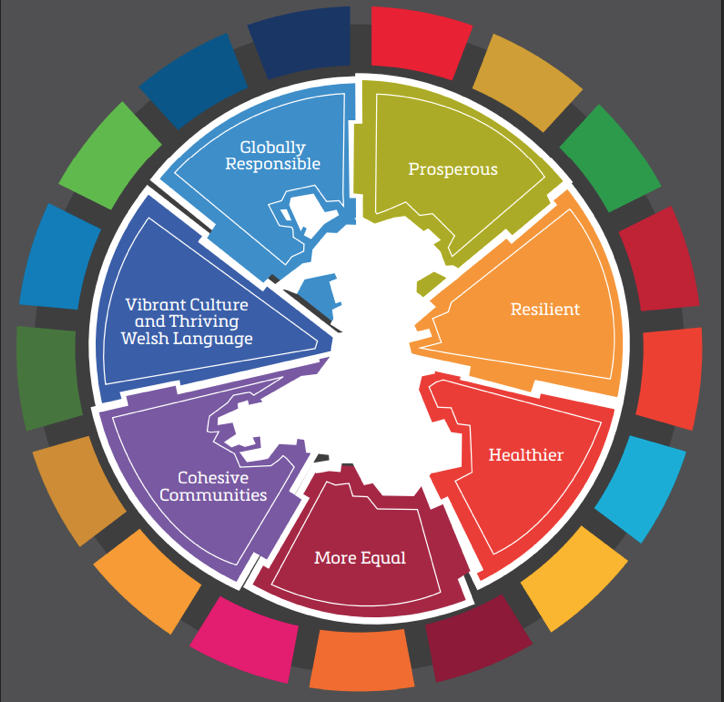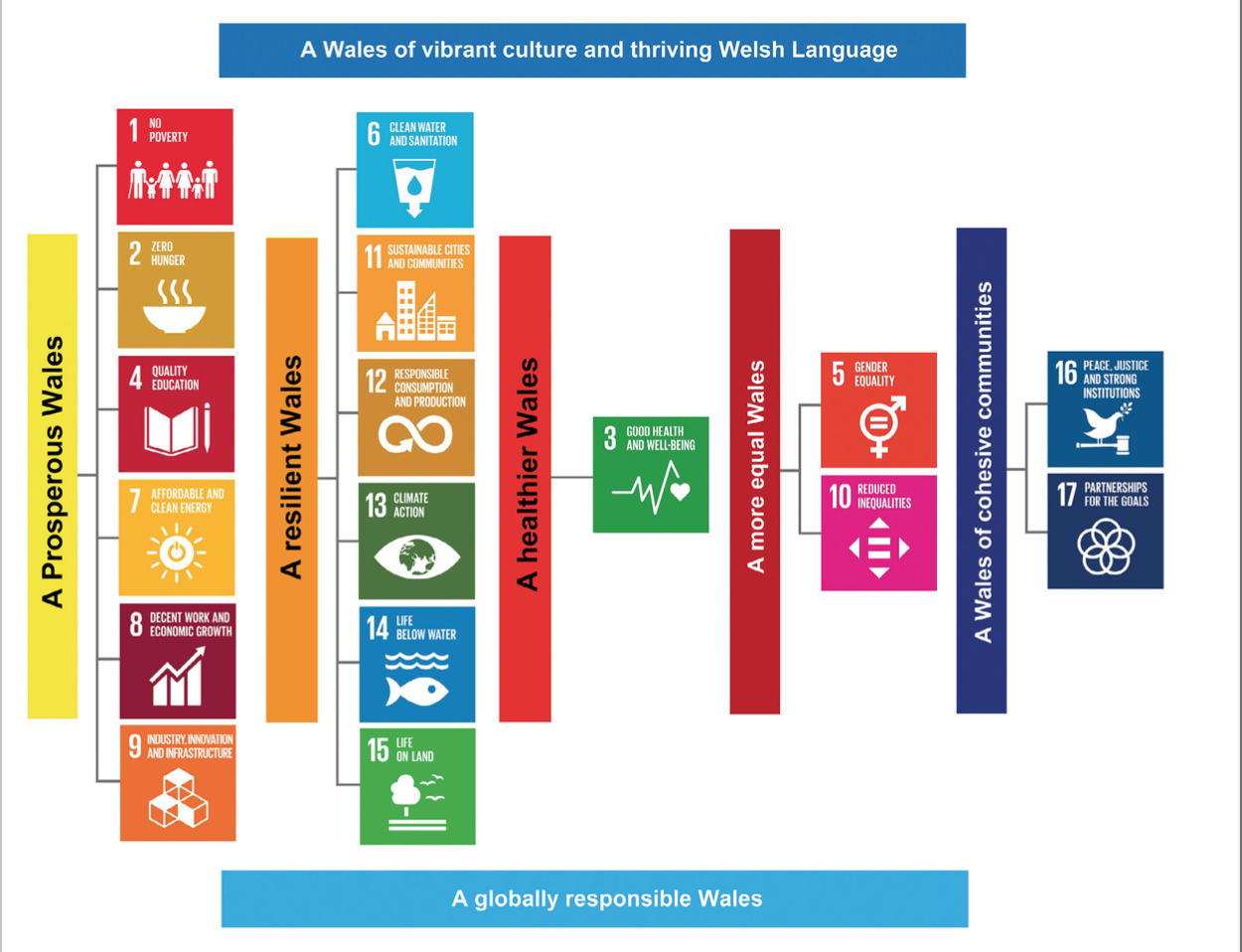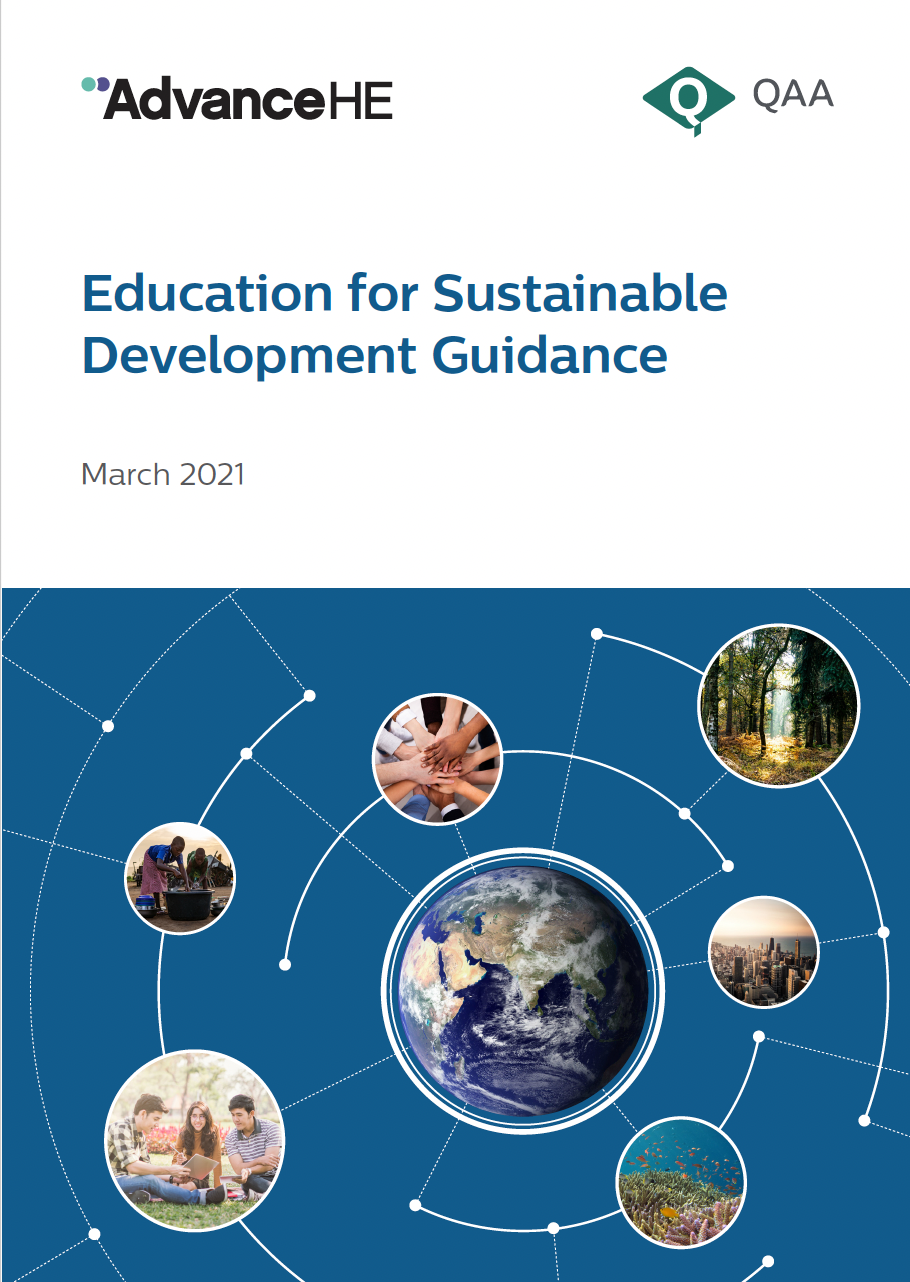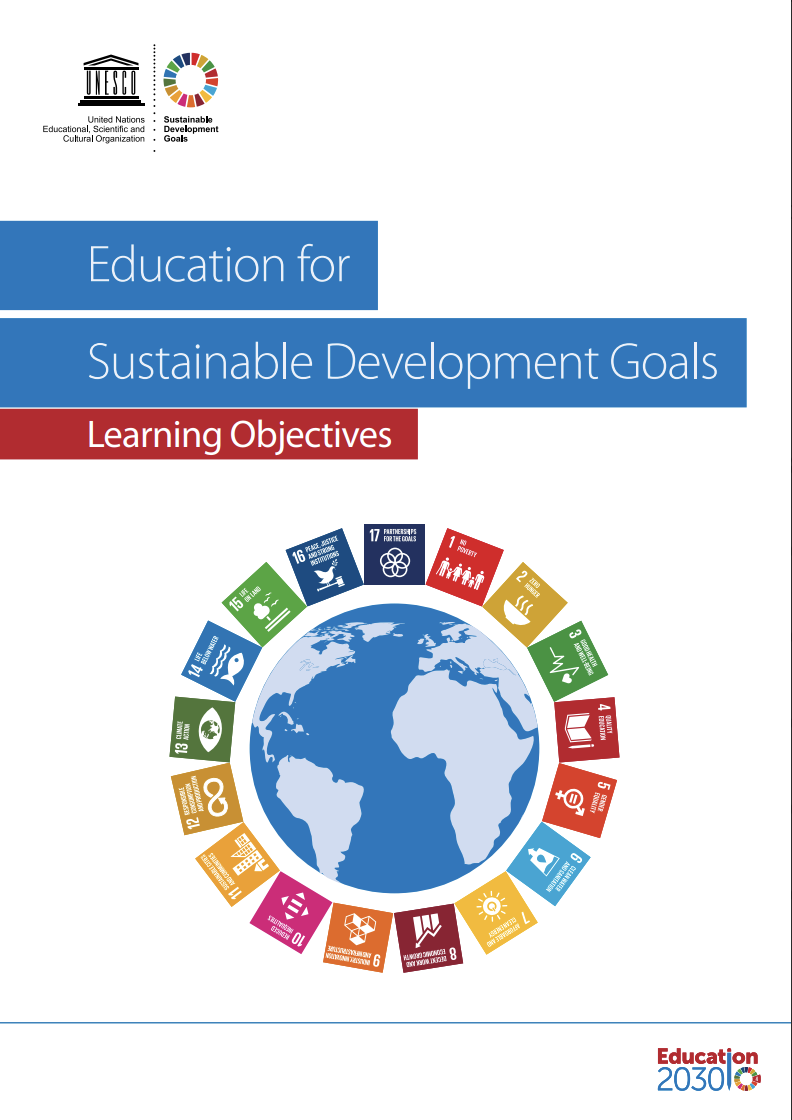Why Sustainability?
A Sustainability theme page

This page will look at the context of our approach to Sustainability at Cardiff University by looking at The Well-being of Future Generations Wales Act (2015), the UN Sustainable Development Goals (SDGs), the QAA / Advance HE Education for Sustainable Development Guidance (2021), and ‘Cardiff University: Our future, together’, as well as the ways in which Sustainability links to the themes of Inclusivity and Employability.
The Well-being of Future Generations Wales Act (2015)
The Well-being of Future Generations Act (2015) is a Welsh Government initiative that aims to ensure that Wales becomes a more sustainable and prosperous place to live, work, and play. The Act sets out a framework for creating a sustainable future that takes into account the needs of future generations. It requires that all public bodies in Wales purposefully consider the long-term impact of their decisions, reflect on how they work with a range of people, and work together to actively prevent persistent problems such as poverty, health inequalities and climate change.
The Future Generations Wales Act highlights seven well-being goals that will support the progression towards a more sustainable Wales.

Alongside these goals there are 5 key ways of working required to support us in reaching these goals.
- Looking to the long term
- Taking an integrated approach
- Involving a diversity of the population
- Working with others in a collaborative way
- Acting to prevent problems occurring or getting worse
Actions:
Take this 5min course by ‘You, me and the future of Wales’ to explore and engage with this topic in more detail in relation to your role and context.
You, me and the future of Wales | OpenLearn - Open University
Have a look at the Future Generations Framework - Future Generations Wales. When you create a project or engage in problem-based learning, it can be useful to use this framework to help situate and contextualise the problem in relation to Wales. It might also help you identify key stakeholders that can support you in developing a solution, or who might benefit from this problem being explored. This might be a useful means of supporting learners to build a living lab project.
Sustainable Futures 2025-2035
One of the main features of the Well-being of Future Generations Act, and it’s guiding key principle, is ensuring that the actions we take now support the needs of the present being met without compromising the ability of future generations to meet their own needs. To do this, it can be helpful to employ ‘Futures thinking’ tasks in learning experiences.
There are many different ways to anticipate, contemplate, imagine and enact paths towards different futures. Have a look at the tools below and choose one that would best work for you in your discipline.
The Three Horizons Toolkit has been developed by Public Health Wales and the Future Generations Commissioner’s Office to help public bodies avoid making decisions that don’t stand the test of time. It is based on a model developed by Bill Sharpe and the International Futures Forum. This toolkit will guide you to think about the future of your discipline in relation to the Well-being of Future generations Act (2015). It will support you to develop pedagogies that can enable discussions around this. It is very useful to scaffold learning experiences around anticipatory thinking, complex problem-solving and active learning.
The UN Sustainable Development Goals (SDGs)
The United Nations Sustainable Development Goals (SDGs), adopted in 2015, consist of 17 goals designed to address global challenges such as poverty, inequality, climate change, environmental degradation, peace, and justice. These goals are interconnected and aim to achieve a more sustainable future for all.
![[Development Goals are shown as rainbow-coloured blocks in an infographic. 1) No poverty represented by a thriving family. 2) Zero hunger represented by a steaming bowl of food. 3) Good health and well-being represented by a pulse. 4) Quality Education represented by a book and pen. 5) Gender Equality represented by gender symbols 6)Clean water and sanitation represented by a glass of water. 7) Affordable and clean energy. represented by a sun with a power on logo in the centre. 8) Decent work and economic growth represented by a bar graph. 9) Industry, innovation & infrastructure represented by blocks. 10) Reduced inequalities represented by an equal sign and a spinning circle. 11) Sustainable cities and communities represented by a cityscape. 12) Responsible consumption and production represented by an infinity symbol 13) Climate action represented by an eye with the world as its pupil. 14) Life below water represented by a fish swimming under water. 15) Life on land represented by a tree with birds flying in the distance. 16) Peace, justice and strong institutions represented by a dove on a gavel with an olive branch in its mouth 17) Partnership for the goals represented by interlocking circles.]](http://sites.cardiff.ac.uk/education-development-toolkit/files/2023/08/SDGs_poster_new1.png)
The SDGs build on the Millennium Development Goals (MDGs) and aim to go further to end all forms of poverty. They recognize that ending poverty and other deprivations must go hand-in-hand with strategies that improve health and education, reduce inequality, and spur economic growth – all while tackling climate change and working to preserve our oceans and forests.
Universities have a role to play in creating a generation of informed and engaged citizens who are prepared to contribute to a sustainable future.
Universities can:
- Demonstrate leadership in sustainability by adopting and promoting ESD, thereby contributing to societal transformation towards sustainability.
- Educate future leaders, professionals, and citizens who will implement and advocate for sustainable practices.
- Conduct research that can lead to innovative solutions for sustainable development.
- Develop local and global partnerships with governments, businesses, and non-profits to implement sustainable practices and policies.
- Model sustainability through their operations, for example, by reducing their carbon footprint, promoting recycling, and ensuring fair employment practices.
The relationship between the UN Sustainable Development Goals and Wales' 7 key well-being goals is illustrated in the image below:

QAA / Advance HE Education for Sustainable Development Guidance (2021)

Jointly published by the Quality Assurance Agency (QAA) and Advance HE, the Education for Sustainable Development Guidance (2021) aims to support higher education institutions in embedding ESD within their curricula. It was developed by an expert group from across the sector to help students acquire the knowledge, understanding, and skills necessary to contribute to a sustainable future.
Watch the following video from the QAA to develop your understanding of Education for Sustainable Development.
The guidance stresses the need for strategic commitment at the institutional level. This includes integrating ESD objectives into institutional policies, course validation processes, staff induction, and quality assurance mechanisms.
The guidance also highlights the importance of engaging a diverse range of stakeholders, including students, employers, academic staff, and community members, in the co-creation of learning experiences that promote sustainability.
Of most relevance to individuals concerned with enhancing their own practice are the practical examples and resources in the guidance, which include case studies, teaching and assessment methods that support the development of sustainability competencies.
Competencies for Sustainability:

The Education for Sustainable Development Guidance provides a clear articulation of the UNESCO ‘key competencies’ for sustainability (see Rieckmann, UNESCO, 2018, pp.39-60). These are summarised on our Embedding Sustainability in Learning and Teaching page.
Further QAA drivers of ESD
It is also important to note that all revised QAA Subject Benchmark Statements now include reference to Sustainability or Education for Sustainable Development.
Cardiff University was involved with a QAA Collaborative Enhancement Project, 'ESD and Academic Quality', to support the integration and development of Education for Sustainable Development with Higher Education Providers. The project builds further on the 2021 guidance, and the appendices to the report are particularly worth exploring.
‘Cardiff University: Our future, together’
‘We will improve our campuses, their sustainability, and the shared experience of being here. That means taking seriously the challenge of climate change and decreasing biodiversity, tackling our carbon footprint, enhancing our green infrastructure, and adapting our buildings to enable us to work better together.’
Cardiff University's ‘Our future, together’ strategy strongly supports Education for Sustainable Development (ESD) by embedding sustainability in its research, education, operations, and community engagement. Here are some of the key commitments that align with our Sustainability theme:
- Tackling Global Challenges:
‘Our future, together’ emphasises generating new knowledge to address significant global challenges such as climate change, biodiversity loss, sustainability, and social justice.
- Sustainability and Resilience:
The new strategy integrates sustainability throughout the institution, both in operations (e.g., decarbonizing and improving green infrastructure) and education. The university commits to fostering critical, resilient, problem-solving graduates who are prepared to work in interdisciplinary and uncertain environments. This reflects ESD’s focus on developing the knowledge, skills, and values needed for sustainable development.
- Interdisciplinary Collaboration:
Cardiff University plans to promote an interdisciplinary approach, breaking down siloes between academic disciplines and fostering cross-sectoral collaboration. ESD similarly values interdisciplinary learning to address complex sustainability issues.
- Living Lab Approach:
‘Our future, together’ promotes the use the university as a "living lab," engaging students, staff, and partners to co-define challenges and develop solutions, reflecting ESD’s emphasis on experiential, real-world learning.
- Social Impact and Global Engagement:
The strategy outlines goals for social mobility, community engagement, and global partnerships that contribute to sustainable development locally and globally. This connects to ESD’s broader goals of fostering global citizenship and contributing to a sustainable future.
‘This strategy embodies our commitment to delivering a better world for future generations, a new manifestation of our progressive history.’
‘We will teach our students in a way that develops them further into resilient, critical, problem-solving change makers who know how to work together in an uncertain, interdisciplinary, cross-sectoral, digitised world.’
Links to Inclusivity and Employability
How does Sustainability tie in with the other key themes of Inclusivity and Employability?
Deeper Dive
References
Dawe, G., Jucker, R., and Martin, S. (2005). Sustainable development in higher education: Current practice and future developments. A report for the Higher Education Academy: York.
Future Generations Wales (2022) ‘Well-being of Future Generations (Wales) Act 2015’. Future Generations Wales. Available from : https://www.futuregenerations.wales/about-us/future-generations-act/ [Accessed on 28/10/24]
Parkin, S., Johnson, A., Buckland, H. and White, E. (2004), Learning and Skills for Sustainable Development: Developing a Sustainability Literate Society, HEPS, London.
QAA and Advance HE (2021) ‘Education for Sustainable Development Guidance’. [online pdf] The Quality Assurance Agency for Higher Education and Advance HE 2021
Sterling, S (2001). Sustainable Education. Devon, England: Green Books
Tilbury, D. and Wortman, D. (2004) Engaging People in Sustainability, IUCN – The World Conservation Union, Gland, Switzerland.
UNESCO (2020) Education for Sustainable Development: a roadmap. Available from: https://unesdoc.unesco.org/ark:/48223/pf0000374802.locale=en
UNESCO (2022) What you need to know about education for sustainable development | UNESCO
Welsh Government (2009) ‘One Wales: One Planet. The Sustainable Development Scheme of the Welsh Assembly Government’. Welsh Government publication. Available from: https://www.bridgend.gov.uk/media/1505/wd32.pdf [Accessed on 31/08/22]
Welsh Government (2019) ‘Wales and the Sustainable Development Goals: Supplementary Report to the United Kingdom of Great Britain and Northern Ireland Voluntary National Review of progress towards the Sustainable Development Goals 2030’. Welsh Government publication. Available from: https://gov.wales/sites/default/files/publications/2019-07/supplementary-report-to-the-uk-review-of-progress-towards-the-sustainable-development-goals-2030_0.pdf [Accessed on 31/08/22]
Welsh Government (2021) ‘The Co-operation Agreement’. Welsh Government publication. Available from: The Co-Operation Agreement (gov.wales) [Accessed on 31/08/22]
Share your feedback
Where next?
You're on page 2 of 4 Sustainability theme pages. Explore the others here:
What Do We Mean By Sustainability?
Embedding Sustainability in Learning and Teaching
Or how about another theme?